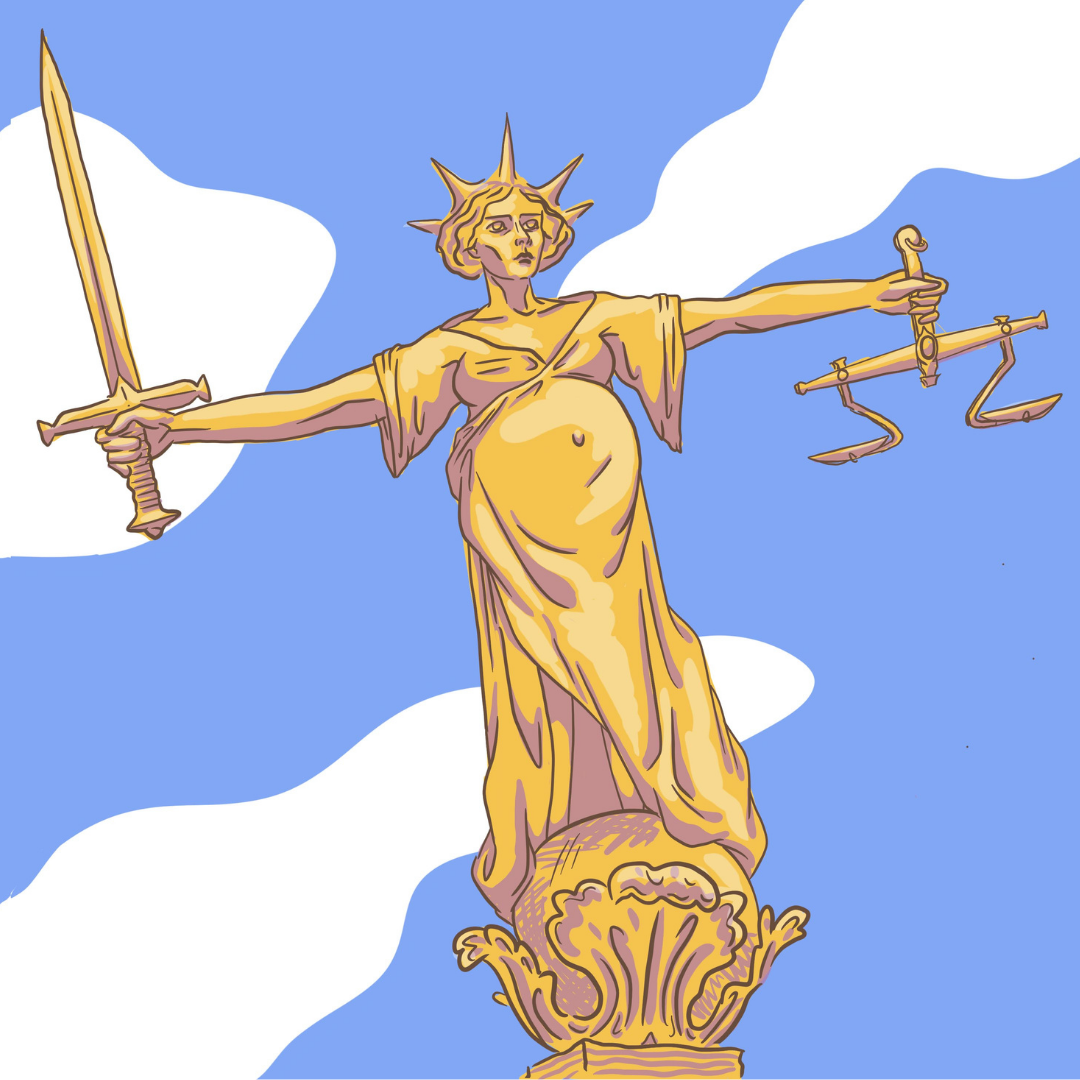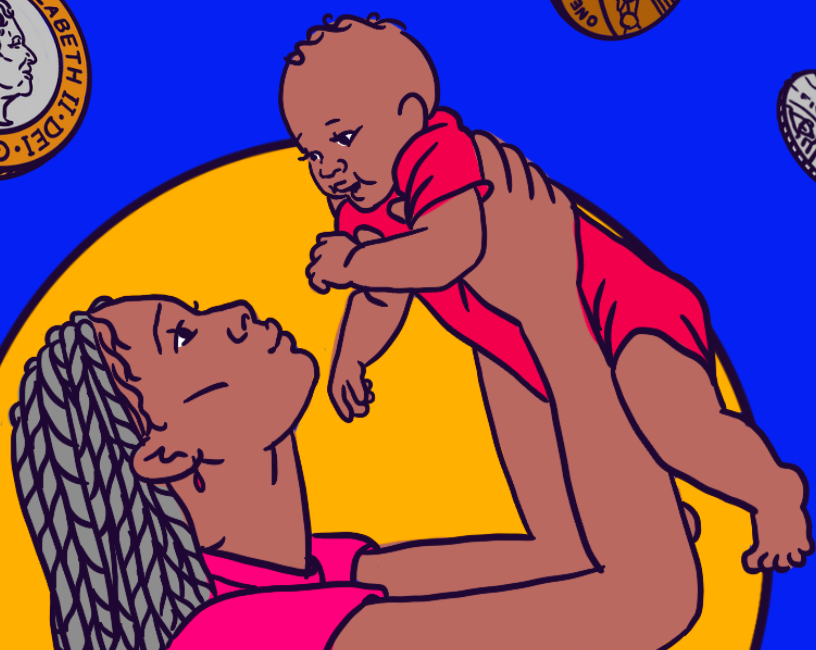Press Release 24th November 2021: Court of Appeal rule that the calculation of the Government’s SEISS scheme discriminated against new mothers
In an important judgment handed down today, the Court of Appeal agreed with Pregnant Then Screwed’s submission that the calculation of the self-employed income support scheme (“SEISS”) indirectly discriminated against new mothers. The Court of Appeal, however, maintained that the urgency with which hard-pressed civil servants acted at the outset of the Covid-19 pandemic justified the discrimination.
However, the ruling clearly stated that this scheme – which was created without any consideration of the experiences of pregnant women and mothers – indirectly discriminated against this group of people. That is a huge win as it now means policy makers, employers, and public bodies have to consider how a decision impacts on women with children.
Joeli Brearley, CEO and founder of Pregnant Then Screwed had this to say:
”Now that we have proven this scheme was deeply flawed, we are asking the Government to reimburse the 75,000 women who have been financially hurt by its inadequate planning. We have heard from women who have been struggling to pay for food and rent because this scheme let them down.
We are also asking the Government to put in systems and processes around its policy-making to ensure something like this never happens again. Pregnancy and maternity leave are not unusual. They are a very normal part of everyday life. The government has a legal obligation to plan for everyone, not just the people who look and sound like them.
Today’s ruling matters because this wasn’t the only Government Pandemic response that hurt and disadvantaged women because the female experience was ignored in Government planning. Pregnant women were the only vulnerable group to not be prioritised for the vaccine. Pregnant women were also ignored when it came to workplace safety guidance and Covid – it took the Government 9 months to publish anything specifically for them. And the furlough scheme failed to spell out to employers that this could be used if a woman was unable to work because of the unpaid care work she had to take on when the schools and nurseries closed. Instead it was just expected that women would pick up all this additional unpaid labour without any mandatory support. So there are a lot of other instances where the Government overlooked women over the last two years.
But this is also important in a much wider application to discrimination that predated Covid and is still happening now. It’s a very significant development for women who are being denied mortgages or bank loans because they took a period of maternity leave and I expect to see that application before too long.’’
SEISS was introduced in spring 2020 to give financial help to self-employed workers impacted during the Covid-19 pandemic. The primary method of calculating payments under SEISS was by reference to an individual’s average trading profits (“ATP”) from three tax years: 2016/17, 2017/18, and 2018/19. The result of this method of calculation was that women who took a period of maternity leave in those tax years would receive a payment that was not representative of their usual profits. The Court accepted that this calculation method led to disproportionately low payments being made to recent mothers and that it was clear that the reason for the lower earnings in past years was gender-related.
Despite the disproportionate impact, the Court of Appeal accepted the evidence of the Government that in the limited time available, it would not have been possible to amend the scheme without compromising the Government’s requirements of speed, simplicity and verifiability.
The findings of the Court are contrary to the comments made by Rishi Sunak MP, The Chancellor of the Exchequer who, when challenged by Ellie Reeves MP in Parliament in May 2020 on the discriminatory impact of the schemes, denied that SEISS was discriminatory. He argued that SEISS did not discriminate because “For all sorts of reasons people have ups and downs and variations in their earnings, whether through maternity, ill-health or others.”
The appeal was powered by thousands of women who contributed their money and their testimonies to this important court case. It was also supported by the Musicians Union, The Federation of Entertainment Union and Community Union.
Leigh Day solicitor Anna Dews said:
“The Court of Appeal has unequivocally found that the calculation of SEISS payments was indirectly discriminatory. While the appeal was ultimately dismissed on the facts of justification due to the circumstances of the early pandemic, my clients are pleased to have clarified the law on discrimination and it appears that other maternity discrimination challenges may now be brought in similar, but less rushed, contexts.”
Jude Bunting, Clare Duffy and Donnchadh Greene of Doughty Street Chambers are instructed by Anna Dews of Leigh Day on behalf of Pregnant then Screwed.
-ENDS-
For further press information from Pregnant Then Screwed please contact: [email protected]
Notes to Editor:
About
Pregnant Then Screwed is a charity which protects, supports and promotes the rights of mothers who suffer the effects of systemic, cultural, and institutional discrimination through our various schemes and activities, including: A free legal advice service, a mentor scheme that supports women who are considering legal action against their employer, lobbying and campaigning for legislative change and creating experiences for mothers which help them rebuild their confidence and find work that works for them.
Our free advice line for mothers can be contacted on: 01612229879
Case Studies
Kerry Chamberlain
To contact Kerry, please send an enquiry to [email protected]
Details: Kerry also acted as a claimant in this case.
“I am a self-employed energy analyst who has been running my business since 2014. In 2017 I took mat leave for 9 months. In 2018 I took a second mat leave (crazy I know!!). I was unable to work as normal because 1) I am looking after my children without access to childcare 2) the clients I work for cut projects. I wrote to my MP voicing my frustrations at mat absence being included in the average calculation - even the money I received as mat allowance isn't considered. My MP raised a question with the chancellor, but we received a paltry, generic and what I deemed offensive reply - apparently mat leave is a loss of income like being sick or having a downturn in trading! I feel like the situation was unacceptable on two fronts.
1) women with young children who are likely to be shouldering heavy income losses through lack of access to childcare are being penalised for having children.
2) the purpose of the calculation was to establish loss of earnings based upon current trading potential. That is at odds with not taking out mat absence.
Also if I was paye the fact that I had two children 3 and 2 years ago wouldn't have negatively impacted my furlough rate.”
Zoe Challenor
To contact Zoe, please send an enquiry to [email protected]
Details: Zoë is the Founder and Director of B’Opera Baby Opera which creates acclaimed performances for babies and toddlers. She runs music projects for refugee families and primary schools through Welsh National Opera. Her children are 6 and 4.
“In March, my self-employed household saw all work and income disappear overnight. The government announced a furlough scheme for employees, but nothing for the self-employed. After much lobbying they changed that, but with no material support until late May, which left us with no money coming in for two months. A further problem for self-employed parents of small children, particularly mothers, is that support was calculated on tax years 2016-2019. So in my case, despite working and earning four days a week, the relief was calculated on a period when I was on maternity leave and looking after a small child. So instead of the 80% provided by the furlough scheme for employees, I received £29 a week, or 5% of my current income. This hasn’t come close to covering my mortgage or basic bills like food. This is in the context that many self-employed mothers will have already taken a huge financial hit and career setback to take unpaid time off to have children in the first place.”
For further case study requests please contact [email protected]
Press Release 24th November 2021: Court of Appeal rule that the calculation of the Government's SEISS scheme discriminated against new mothers
In an important judgment handed down today, the Court of Appeal agreed with Pregnant Then Screwed’s submission that the calculation of the self-employed income support scheme (“SEISS”) indirectly discriminated against new mothers. The Court of Appeal, however, maintained that the urgency with which hard-pressed civil servants acted at the outset of the Covid-19 pandemic justified the discrimination.
However, the ruling clearly stated that this scheme - which was created without any consideration of the experiences of pregnant women and mothers - indirectly discriminated against this group of people. That is a huge win as it now means policy makers, employers, and public bodies have to consider how a decision impacts on women with children.
Joeli Brearley, CEO and founder of Pregnant Then Screwed had this to say:
''Now that we have proven this scheme was deeply flawed, we are asking the Government to reimburse the 75,000 women who have been financially hurt by its inadequate planning. We have heard from women who have been struggling to pay for food and rent because this scheme let them down.
We are also asking the Government to put in systems and processes around its policy-making to ensure something like this never happens again. Pregnancy and maternity leave are not unusual. They are a very normal part of everyday life. The government has a legal obligation to plan for everyone, not just the people who look and sound like them.
Today's ruling matters because this wasn’t the only Government Pandemic response that hurt and disadvantaged women because the female experience was ignored in Government planning. Pregnant women were the only vulnerable group to not be prioritised for the vaccine. Pregnant women were also ignored when it came to workplace safety guidance and Covid - it took the Government 9 months to publish anything specifically for them. And the furlough scheme failed to spell out to employers that this could be used if a woman was unable to work because of the unpaid care work she had to take on when the schools and nurseries closed. Instead it was just expected that women would pick up all this additional unpaid labour without any mandatory support. So there are a lot of other instances where the Government overlooked women over the last two years.
But this is also important in a much wider application to discrimination that predated Covid and is still happening now. It's a very significant development for women who are being denied mortgages or bank loans because they took a period of maternity leave and I expect to see that application before too long.’'
SEISS was introduced in spring 2020 to give financial help to self-employed workers impacted during the Covid-19 pandemic. The primary method of calculating payments under SEISS was by reference to an individual’s average trading profits (“ATP”) from three tax years: 2016/17, 2017/18, and 2018/19. The result of this method of calculation was that women who took a period of maternity leave in those tax years would receive a payment that was not representative of their usual profits. The Court accepted that this calculation method led to disproportionately low payments being made to recent mothers and that it was clear that the reason for the lower earnings in past years was gender-related.
Despite the disproportionate impact, the Court of Appeal accepted the evidence of the Government that in the limited time available, it would not have been possible to amend the scheme without compromising the Government’s requirements of speed, simplicity and verifiability.
The findings of the Court are contrary to the comments made by Rishi Sunak MP, The Chancellor of the Exchequer who, when challenged by Ellie Reeves MP in Parliament in May 2020 on the discriminatory impact of the schemes, denied that SEISS was discriminatory. He argued that SEISS did not discriminate because “For all sorts of reasons people have ups and downs and variations in their earnings, whether through maternity, ill-health or others."
The appeal was powered by thousands of women who contributed their money and their testimonies to this important court case. It was also supported by the Musicians Union, The Federation of Entertainment Union and Community Union.
Leigh Day solicitor Anna Dews said:
“The Court of Appeal has unequivocally found that the calculation of SEISS payments was indirectly discriminatory. While the appeal was ultimately dismissed on the facts of justification due to the circumstances of the early pandemic, my clients are pleased to have clarified the law on discrimination and it appears that other maternity discrimination challenges may now be brought in similar, but less rushed, contexts.”
Jude Bunting, Clare Duffy and Donnchadh Greene of Doughty Street Chambers are instructed by Anna Dews of Leigh Day on behalf of Pregnant then Screwed.
-ENDS-
For further press information from Pregnant Then Screwed please contact: [email protected]
Notes to Editor:
About
Pregnant Then Screwed is a charity which protects, supports and promotes the rights of mothers who suffer the effects of systemic, cultural, and institutional discrimination through our various schemes and activities, including: A free legal advice service, a mentor scheme that supports women who are considering legal action against their employer, lobbying and campaigning for legislative change and creating experiences for mothers which help them rebuild their confidence and find work that works for them.
Our free advice line for mothers can be contacted on: 01612229879
Case Studies
Kerry Chamberlain
To contact Kerry, please send an enquiry to [email protected]
Details: Kerry also acted as a claimant in this case.
“I am a self-employed energy analyst who has been running my business since 2014. In 2017 I took mat leave for 9 months. In 2018 I took a second mat leave (crazy I know!!). I was unable to work as normal because 1) I am looking after my children without access to childcare 2) the clients I work for cut projects. I wrote to my MP voicing my frustrations at mat absence being included in the average calculation - even the money I received as mat allowance isn't considered. My MP raised a question with the chancellor, but we received a paltry, generic and what I deemed offensive reply - apparently mat leave is a loss of income like being sick or having a downturn in trading! I feel like the situation was unacceptable on two fronts.
1) women with young children who are likely to be shouldering heavy income losses through lack of access to childcare are being penalised for having children.
2) the purpose of the calculation was to establish loss of earnings based upon current trading potential. That is at odds with not taking out mat absence.
Also if I was paye the fact that I had two children 3 and 2 years ago wouldn't have negatively impacted my furlough rate.”
Zoe Challenor
To contact Zoe, please send an enquiry to [email protected]
Details: Zoë is the Founder and Director of B’Opera Baby Opera which creates acclaimed performances for babies and toddlers. She runs music projects for refugee families and primary schools through Welsh National Opera. Her children are 6 and 4.
“In March, my self-employed household saw all work and income disappear overnight. The government announced a furlough scheme for employees, but nothing for the self-employed. After much lobbying they changed that, but with no material support until late May, which left us with no money coming in for two months. A further problem for self-employed parents of small children, particularly mothers, is that support was calculated on tax years 2016-2019. So in my case, despite working and earning four days a week, the relief was calculated on a period when I was on maternity leave and looking after a small child. So instead of the 80% provided by the furlough scheme for employees, I received £29 a week, or 5% of my current income. This hasn’t come close to covering my mortgage or basic bills like food. This is in the context that many self-employed mothers will have already taken a huge financial hit and career setback to take unpaid time off to have children in the first place.”
For further case study requests please contact [email protected]



